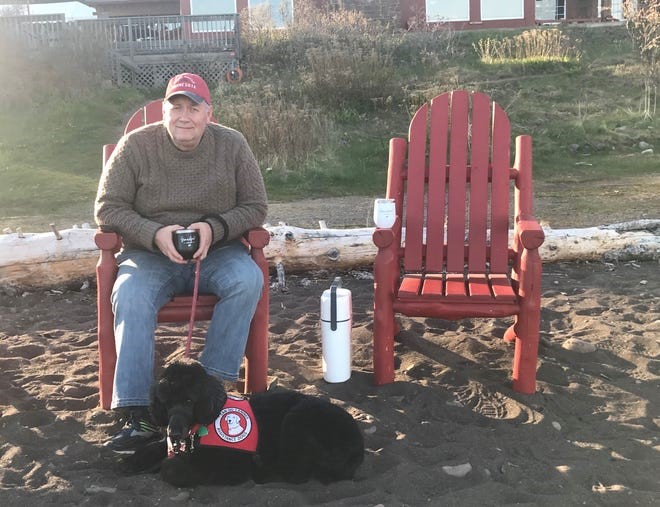
PRESS ROOM
From the South Bend Tribune
South Bend native, service dog featured in 'Puppy Bowl' show
West-side roots played role in can-do spirit
South Bend Tribune
When Parkinson’s disease causes 60-year-old Marty Lukaszewski to lock up, a black poodle named Laverne comes and gently nudges the hamstring muscle on the back of his leg.
And he starts moving again.
“That bit of inertia is all you need,” said the South Bend native who now lives in a northwest suburb of Minneapolis.
The service dog also will pick up things that he drops, saving him from bending down, which brings a 9-out-of-10 risk that he’ll go foggy in the head and black out.
Animal Planet and Can Do Canines
In the face of Parkinson’s, such everyday feats may not land Lukaszewski and Laverne in the Olympics, let alone the Super Bowl. But they do come close to “Puppy Bowl XVIII,” hosted by Martha Stewart and Snoop Dogg to highlight adoptable dogs, which will air at 2 p.m. on the Animal Planet channel before Sunday’s football smash-up.
Lukaszewski and Laverne appear for two minutes in a 16-minute Animal Planet program, titled “Puppy Bowl: More Ways to Serve,” illustrating the work of a Minneapolis-area charity, Can Do Canines, that provides service dogs to Minnesota and Wisconsin residents with disabilities and medical conditions.
Although it won’t air on the TV channel, the show can be watched now at the Animal Planet’s website and streamed via discovery+ and the Animal Planet GO app.
Lukaszewski exhibits the don’t-get-me-down attitude that he attributes to his west-side South Bend upbringing under two parents who both coached sports. His parents, Thomas and Sandy Lukaszewski, coached volleyball for many years at St. Adalbert’s School, and his dad also coached baseball at Holy Family School and Matthys Little League.
Marty, a 1980 graduate of Washington High School, worked as a cook in local restaurants before earning his teaching degree at Indiana University South Bend in 1997. He went on to teach English and language arts at Bridgman and Cassopolis Ross Beatty high schools and at Veritas Academy in South Bend, including drama at Bridgman and Cassopolis and a summer youth program at the Barn Swallow Theatre in Edwardsburg.
In his first year of teaching, in 1998, he walked an uneven line to the principal’s office, leading some staff to ask if he was drunk. He wasn’t. Tremors in his arms and legs led him to a medical specialist in Indianapolis, but he was told he was too young to have Parkinson’s.
In 2012, Marty recalled by phone from his home office, he moved to the Minneapolis area to marry his wife, Jean. They wed in January 2013. Within a year, a knee injury ended the running that he’d taken up and that had helped him to lose weight. He soon needed a wheelchair to shop in grocery stores. Symptoms mounted thanks to the loss of exercise, and in January 2014, he was finally diagnosed with Parkinson’s.
Service dog Laverne arrives to help
Laverne arrived in 2017 at a time when, Marty said, “I was struggling. I was falling a lot.”
Six weeks later, he fell in his house, taking down a glass picture frame that shattered on the ground. Unable to arise, he called for Laverne: “Help find my phone.”
She fetched it. Marty then called his wife, who returned home to help.
Laverne started doing the little things that Jean had done, which not only gave his wife peace of mind but enabled her to take a job as director of a hospice organization.
Laverne serves as a brace when Marty needs to get off the ground. And, prior to the pandemic, she accompanied him to his job as a teacher with Minnesota Transitions Charter School, where he also serves on the school[sic] board. There, he said, she had a calming effect on students when he was in the classroom.
But he’s told students, “I am your service dog,” comparing himself to his poodle: “She’s not going to do everything for me, but she’s going to assist me when I need it.”
During the pandemic, he’s taken her out to student testing sites where, upon seeing Laverne, he said, “You see nervousness go out the window.”
He’s recently taken on cross-country skiing and snowshoeing as part of his push to stay active. Focused physical activity is therapeutic for Parkinson’s patients, helping to keep their motor skills from deteriorating.
Besides, Marty said, “We’re not going to let this thing called Parkinson’s stop us.”
Part of that can-do attitude, he said, comes from his youth in South Bend and playing sports. His mom and his sisters still live in South Bend. Thanks to the pandemic and the reality that the coronavirus could complicate his condition, the last time he returned home was in July 2020 for his father’s funeral. He hopes to come back this spring or summer.
“The independence has been phenomenal,” he said of his life now, grateful to have “such a beautiful creature as (Laverne).”
All he paid for her was a $50 application fee to the Minneapolis charity, Can Do Canines, that provided her, though it cost more than $25,000 to house and train her at the time – a cost that, marketing director Caren Hansen says, has since surpassed $45,000.
Marty wanted to give back. So, he’s given speeches to civic groups and quickly agreed to the Animal Planet show. It features him and two other recipients of the charity’s dogs and highlights a prison program that helps to train the dogs while providing therapy for inmates.
Every time Marty views his and Laverne’s two minutes of fame, he said, “I still tear up.”
Where to watch
“Puppy Bowl: More Ways to Serve” can be watched now at Animal Planet’s website, via a link in this story online, as well as the streaming service discovery+. Also, it will be available on the Animal Planet GO app for anyone with a cable subscription.
This News Story Appeared At https://www.southbendtribune.com/story/news/2022/02/11/animal-planet-puppy-bowl-south-bend-indiana-service-dog-parkinsons-can-do-canines/6734653001/
Published at 5:53 am ET, Feb. 11, 2022
